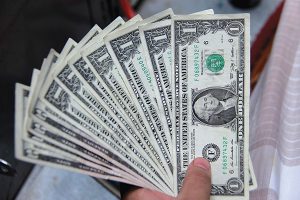Bloomberg
US index futures and European stocks rose as dip buyers wagered the global economic impact of escalating sanctions on Russia is already reflected in market prices.
Contracts expiring later this month on the S&P 500 and Nasdaq 100 gauges added at least 1.2% each after US equities tumbled to a nine-month low. Banks and automakers boosted Europe’s Stoxx 600 to a second-day gain. Oil prices remained firm, a day after President Joe Biden banned fossil-fuel imports from Russia. Treasuries slid, and dollar weakened for the first time in five days, as haven demand waned.
Investors are bracing for a global inflation shock from a commodity-price rally fuelled by Russia’s isolation even as supply disruptions threaten to usher in a period of slower global growth. The next few days will give them clues on how central banks plan to address the problem: The European Central Bank will announce its rate decision, followed by the Federal Reserve and the Bank of England next week.
“Stock markets are highly volatile as uncertainties loom,†Ipek Ozkardeskaya, a senior analyst at Swissquote, wrote in a note. “Rallies are mostly driven by intra-day trades, whereas longer-term investors are leaving the market.â€
Commodity costs underline the inflation challenge for the Fed, which is expected to hike interest rates next week. In Australia, central bank Governor Philip Lowe said a rate increase later this year is “plausible†as Russia’s invasion creates a new supply shock.
“The duration of this incursion is really going to weigh on the economics of both Europe and the US,†Victoria Fernandez, Crossmark Global Investments chief market strategist, said on Bloomberg Television. She added the firm is cautious but has been in the market trying to be “opportunistic.â€
The Fed is widely expected to hike rates by 25 basis points. The breakeven rate on 30-year inflation-linked Treasuries — an indication of what the market sees the annual pace of consumer-price gains averaging over the next three decades — climbed to its highest level since 2013. The ECB’s meeting, however, may reflect caution as Russia’s war on Ukraine has upended the continent’s economic outlook.
Meanwhile, Coca-Cola Co joined McDonald’s Corp, Starbucks Corp and a host of other companies in suspending Russia operations in protest at the war. Fitch Ratings cut Russia’s credit rating and said a bond default is “imminent.â€
Russian forces intensified their bombardment of Ukraine’s capital Kyiv, the US said. The Russian stock
market’s trading halt is being extended in an effort to
keep prices from tumbling in the wake of vast international sanctions.
In cryptocurrencies, Bitcoin staged a rally, scaling $42,000. In a since-removed statement posted to the Treasury website, Treasury Secretary Janet Yellen seemed to suggest Biden’s upcoming executive order would be constructive for the secotr.
MSCI Inc’s Asia-Pacific index was weighed down by both China and Hong Kong, where a move by the world’s largest sovereign wealth fund to snub an apparel firm stirred investor angst. The Stoxx Europe 600 rose 2.6% in London. Futures on the S&P 500 rose 1.2%. Futures on the Nasdaq 100 rose 1.4%. Futures on the Dow Jones Industrial Average rose 1.1%. The MSCI Asia Pacific Index rose 0.3%. The MSCI Emerging Markets Index rose 0.5%.
The Bloomberg Dollar Spot Index fell 0.3%. The euro rose 0.5% to $1.0953. The Japanese yen was little changed at 115.77 per dollar. The offshore yuan was little changed at 6.3210 per dollar. The British pound rose 0.3% to $1.3143.
The yield on 10-year Treasuries advanced three basis points to 1.88%. Germany’s 10-year yield advanced two basis points to 0.13%. Britain’s 10-year yield was little changed at 1.44%.
Brent crude rose 0.9% to $129.15 a barrel. Spot gold fell 0.3% to $2,044.35 an ounce.
 The Gulf Time Newspaper One of the finest business newspapers in the UAE brought to you by our professional writers and editors.
The Gulf Time Newspaper One of the finest business newspapers in the UAE brought to you by our professional writers and editors.
